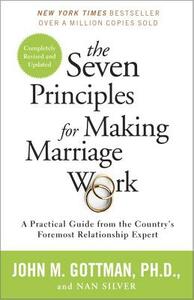You need to sign in or sign up before continuing.
Take a photo of a barcode or cover
Admittedly, I flipped through most of this, because we're still doing okay. It just seems like common sense to me (catch up with what's going on with each other, be affectionate, don't be critical, learn to compromise), but I think of the toxic relationships I know, and I can see how what I think of as "silly exercises" can really help. Especially the last few chapters of the book, which give examples of frequent points of contention between couples, and show the difference between problems that are solvable, and those that are permanent, and focus on the former, to save yourself a lot of grief.
I am making a mental note though to express more of an interest in my SO's life. So that's my homework.
I am making a mental note though to express more of an interest in my SO's life. So that's my homework.
challenging
emotional
hopeful
informative
inspiring
reflective
tense
medium-paced
hopeful
informative
lighthearted
reflective
medium-paced
The principles seem useful and practical/realistic. However, the book seems heavily geared towards heterosexual couples (which I guess I knew ahead of time) and also really feels full of stereotypes, like the husband hating house chores and the wife nagging him to do them (although I guess that the stats from the real world, when averaged, might really match the description).
challenging
informative
reflective
slow-paced
informative
medium-paced
emotional
hopeful
informative
inspiring
reflective
medium-paced
I’ve been wanting to read something by the Gottmans for a long time since they’re such big names in relationship research. Most of their books are more self-help style than just presenting the research (which is what I was wanting), but I think this one actually did a fantastic blend of both of them- it summarizes the research, provides an example and then leads into practical exercises the reader can use. Despite the name, I think this book is a great read at any time (I’m not married); I think it provides a great overview of what healthy relationships can look like and how to get there.
I have two very small nitpicks:
1) I think maybe a more explicit acknowledgment of the times where a break-up may be warranted? E.g. if these steps go nowhere. Or there’s an example in the compromise chapter given of “One wants kids, the other doesn’t” but then the examples he talks through all have compromise-able solutions (eg “one wants to spend, one wants to save, they compromise by setting portions in the budget for both”). I think if he was going to mention examples like the kids thing, it’s worth explicitly mentioning that some things may warrant a break-up no matter how much you communicate about it (or clarify in the first place you’re not talking about those examples).
2) I kind of wanted to side-eye the amount that some chapters rely on gender roles, but I decided not to since there are patterns and trends that can emerge in relationships based on gender, and the author does a good job of clarifying that these things are the common trends but hold true regardless of what gender is holding what role in the relationship. If there’s another updated version it would be nice to have at least some sort of recognition that not all relationships are man+woman.
Otherwise I thought this was chock-full of useful and interesting information and I plan to come back to it again!
I have two very small nitpicks:
1) I think maybe a more explicit acknowledgment of the times where a break-up may be warranted? E.g. if these steps go nowhere. Or there’s an example in the compromise chapter given of “One wants kids, the other doesn’t” but then the examples he talks through all have compromise-able solutions (eg “one wants to spend, one wants to save, they compromise by setting portions in the budget for both”). I think if he was going to mention examples like the kids thing, it’s worth explicitly mentioning that some things may warrant a break-up no matter how much you communicate about it (or clarify in the first place you’re not talking about those examples).
2) I kind of wanted to side-eye the amount that some chapters rely on gender roles, but I decided not to since there are patterns and trends that can emerge in relationships based on gender, and the author does a good job of clarifying that these things are the common trends but hold true regardless of what gender is holding what role in the relationship. If there’s another updated version it would be nice to have at least some sort of recognition that not all relationships are man+woman.
Otherwise I thought this was chock-full of useful and interesting information and I plan to come back to it again!
challenging
informative
reflective
slow-paced
Excellent and practical research-backed advice, complete with lots of examples and exercises to practice. What more do you want?


